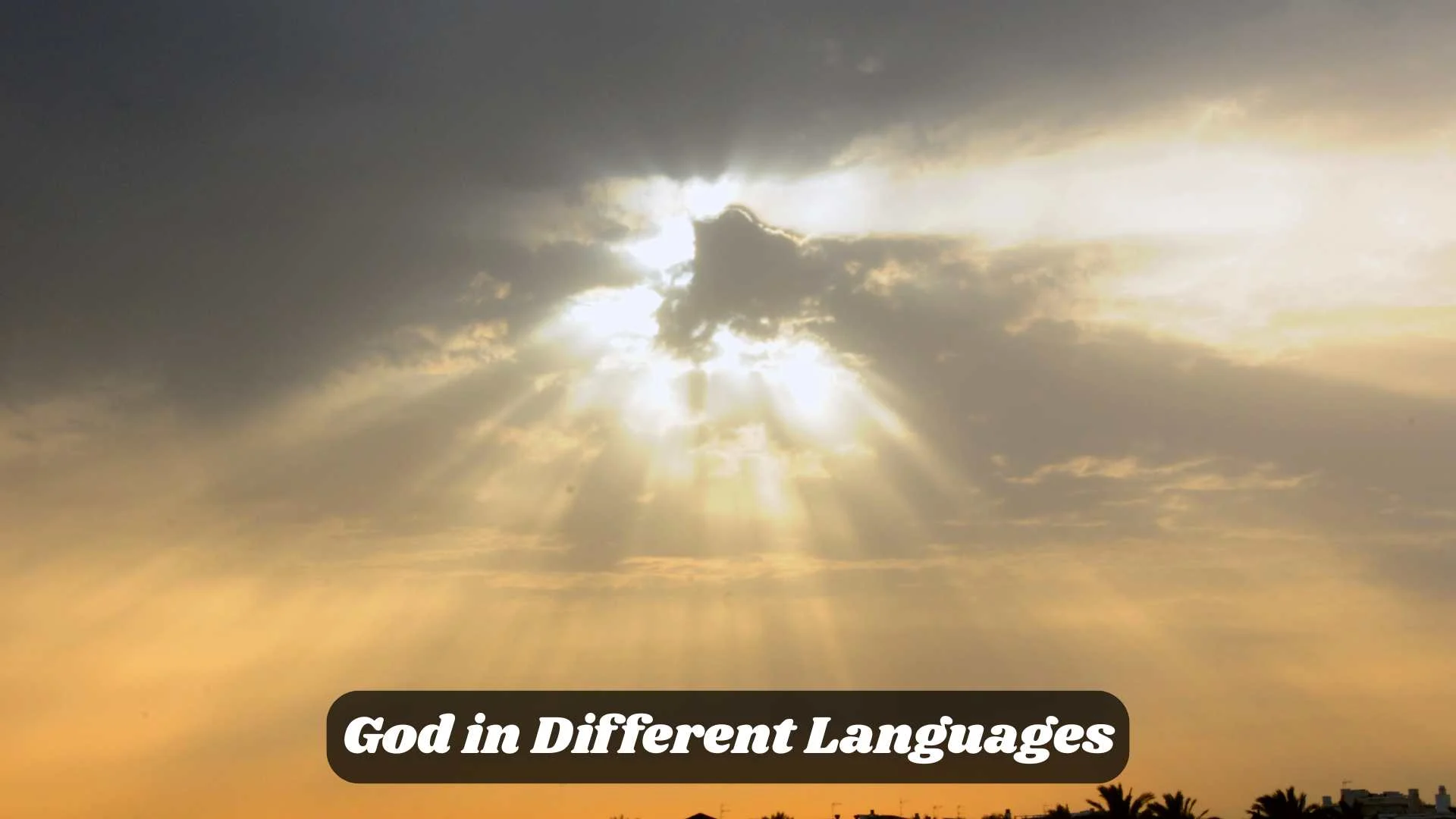Have you ever wondered how people around the world say “God”?
Across cultures, languages, and traditions, this single word carries profound meaning, reverence, and spirituality.
In this article, we’ll explore God in Different Languages — discovering how diverse communities express their devotion and connection to the divine.
This guide is written just for you — the curious soul who wants to learn not only the translations but also the unique ways each language conveys respect, love, and awe for the higher power.
By the end, you’ll have a beautiful collection of words from around the globe, each one carrying its own rich history and significance.
🌐 How to Say God in 70 Different Languages
- English (🇬🇧) – God | Pronunciation: gawd
Example: God is always with us. - Spanish (🇪🇸) – Dios | Pronunciation: dee-ohs
Example: Dios nos bendiga. (God bless us.) - French (🇫🇷) – Dieu | Pronunciation: dyuh
Example: Que Dieu vous protège. (May God protect you.) - German (🇩🇪) – Gott | Pronunciation: got
Example: Gott ist überall. (God is everywhere.) - Italian (🇮🇹) – Dio | Pronunciation: dee-oh
Example: Dio è misericordioso. (God is merciful.) - Portuguese (🇵🇹) – Deus | Pronunciation: deh-oos
Example: Deus é amor. (God is love.) - Russian (🇷🇺) – Бог (Bog) | Pronunciation: bohg
Example: Бог с нами. (God is with us.) - Chinese (Mandarin) (🇨🇳) – 上帝 (Shàngdì) | Pronunciation: shahng-dee
Example: 上帝保佑我们. (God bless us.) - Japanese (🇯🇵) – 神 (Kami) | Pronunciation: kah-mee
Example: 神はすべてを見守る. (God watches over everything.) - Korean (🇰🇷) – 하나님 (Hananim) | Pronunciation: hah-nah-neem
Example: 하나님은 우리와 함께 계십니다. (God is with us.) - Arabic (🇸🇦) – الله (Allah) | Pronunciation: al-lah
Example: الله رحيم. (God is merciful.) - Hindi (🇮🇳) – भगवान (Bhagwān) | Pronunciation: bhug-WAAN
Example: भगवान हम सभी के साथ हैं। (God is with all of us.) - Urdu (🇵🇰) – خدا (Khuda) | Pronunciation: khoo-dah
Example: خدا ہم سب کے ساتھ ہے۔ (God is with us.) - Turkish (🇹🇷) – Tanrı | Pronunciation: tahn-ruh
Example: Tanrı yardımcımız olsun. (May God help us.) - Greek (🇬🇷) – Θεός (Theós) | Pronunciation: theh-OS
Example: Ο Θεός είναι μεγάλος. (God is great.) - Hebrew (🇮🇱) – אלוהים (Elohim) | Pronunciation: eh-loh-HEEM
Example: אלוהים אוהב את כולם. (God loves everyone.) - Thai (🇹🇭) – พระเจ้า (Phra Chao) | Pronunciation: prah-jao
Example: พระเจ้าคุ้มครองเรา. (God protects us.) - Vietnamese (🇻🇳) – Chúa | Pronunciation: choo-ah
Example: Chúa phù hộ cho bạn. (God bless you.) - Swahili (🇰🇪) – Mungu | Pronunciation: moon-goo
Example: Mungu yupo pamoja nasi. (God is with us.) - Zulu (🇿🇦) – uNkulunkulu | Pronunciation: oo-noon-KOO-loo
Example: uNkulunkulu uyasihola. (God guides us.) - Polish (🇵🇱) – Bóg | Pronunciation: boog
Example: Bóg jest miłością. (God is love.) - Dutch (🇳🇱) – God | Pronunciation: got
Example: God is overal. (God is everywhere.) - Swedish (🇸🇪) – Gud | Pronunciation: good
Example: Gud vakar över oss. (God watches over us.) - Finnish (🇫🇮) – Jumala | Pronunciation: yoo-mah-lah
Example: Jumala on armollinen. (God is merciful.) - Hungarian (🇭🇺) – Isten | Pronunciation: ees-ten
Example: Isten szeret minket. (God loves us.) - Czech (🇨🇿) – Bůh | Pronunciation: booh
Example: Bůh je s námi. (God is with us.) - Romanian (🇷🇴) – Dumnezeu | Pronunciation: doo-meh-ZOO
Example: Dumnezeu ne binecuvântează. (God blesses us.) - Ukrainian (🇺🇦) – Бог (Boh) | Pronunciation: boh
Example: Бог любить всіх. (God loves everyone.) - Persian (🇮🇷) – خدا (Khodā) | Pronunciation: kho-DAH
Example: خدا مهربان است. (God is kind.) - Malay (🇲🇾) – Tuhan | Pronunciation: too-HAHN
Example: Tuhan melindungi kita. (God protects us.) - Indonesian (🇮🇩) – Tuhan | Pronunciation: too-HAHN
Example: Tuhan Maha Kuasa. (God is Almighty.) - Filipino (🇵🇭) – Diyos | Pronunciation: dee-YOS
Example: Diyos ang gabay natin. (God is our guide.) - Danish (🇩🇰) – Gud | Pronunciation: good
Example: Gud er med os. (God is with us.) - Norwegian (🇳🇴) – Gud | Pronunciation: good
Example: Gud elsker alle. (God loves everyone.) - Slovak (🇸🇰) – Boh | Pronunciation: boh
Example: Boh je s nami. (God is with us.) - Slovenian (🇸🇮) – Bog | Pronunciation: bohg
Example: Bog je ljubezen. (God is love.) - Bulgarian (🇧🇬) – Бог (Bog) | Pronunciation: bohg
Example: Бог е с нас. (God is with us.) - Croatian (🇭🇷) – Bog | Pronunciation: bohg
Example: Bog voli sve. (God loves everyone.) - Serbian (🇷🇸) – Бог (Bog) | Pronunciation: bohg
Example: Бог је милостив. (God is merciful.) - Bosnian (🇧🇦) – Bog | Pronunciation: bohg
Example: Bog nas vodi. (God guides us.) - Estonian (🇪🇪) – Jumal | Pronunciation: yoo-MAHL
Example: Jumal on armuline. (God is merciful.) - Latvian (🇱🇻) – Dievs | Pronunciation: d-yehvs
Example: Dievs mūs sargā. (God protects us.) - Lithuanian (🇱🇹) – Dievas | Pronunciation: d-yeh-vas
Example: Dievas myli visus. (God loves everyone.) - Maltese (🇲🇹) – Alla | Pronunciation: AH-lah
Example: Alla jagħti ġieħ. (God grants honor.) - Icelandic (🇮🇸) – Guð | Pronunciation: guth
Example: Guð er alls staðar. (God is everywhere.) - Irish (🇮🇪) – Dia | Pronunciation: DEE-ah
Example: Dia leat. (God be with you.) - Welsh (🏴) – Duw | Pronunciation: DEE-oo
Example: Duw yw cariad. (God is love.) - Hawaiian (🇺🇸) – Akua | Pronunciation: AH-koo-ah
Example: Akua e aloha. (God is love.) - Maori (🇳🇿) – Atua | Pronunciation: AH-too-ah
Example: Atua te arataki i a tatou. (God guides us.) - Afrikaans (🇿🇦) – God | Pronunciation: got
Example: God is liefde. (God is love.) - Amharic (🇪🇹) – እግዚአብሔር (Egziabher) | Pronunciation: ehg-zee-ah-bher
Example: እግዚአብሔር ምሕረት ነው። (God is merciful.) - Bengali (🇧🇩) – ঈশ্বর (Ishwar) | Pronunciation: EE-shwar
Example: ঈশ্বর আমাদের সঙ্গে আছেন। (God is with us.) - Tamil (🇮🇳) – கடவுள் (Kadavul) | Pronunciation: kah-da-VOOL
Example: கடவுள் எப்போதும் நமுடன் இருக்கிறார். (God is always with us.) - Telugu (🇮🇳) – దేవుడు (Devudu) | Pronunciation: deh-VOO-doo
Example: దేవుడు మనతో ఉన్నాడు. (God is with us.) - Kannada (🇮🇳) – ದೇವರು (Devaru) | Pronunciation: deh-VAH-roo
Example: ದೇವರು ನಮ್ಮೊಡನೆ ಇದ್ದಾರೆ. (God is with us.) - Malayalam (🇮🇳) – ദൈവം (Daivam) | Pronunciation: DAI-vam
Example: ദൈവം എപ്പോഴും നമ്മുടെ കൂടെയാണ്. (God is always with us.) - Gujarati (🇮🇳) – ભગવાન (Bhagwan) | Pronunciation: bhug-WAHN
Example: ભગવાન આપણા સાથે છે. (God is with us.) - Marathi (🇮🇳) – देव (Dev) | Pronunciation: dev
Example: देव आमच्यासोबत आहे. (God is with us.) - Punjabi (🇮🇳/🇵🇰) – ਪਰਮਾਤਮਾ (Parmātamā) | Pronunciation: par-mah-TAH-mah
Example: ਪਰਮਾਤਮਾ ਸਾਡੇ ਨਾਲ ਹੈ। (God is with us.) - Nepali (🇳🇵) – भगवान (Bhagawān) | Pronunciation: bhug-WAAN
Example: भगवान हामीसँग हुनुहुन्छ। (God is with us.) - Sinhala (🇱🇰) – දෙවියන් (Deviyan) | Pronunciation: deh-VEE-yan
Example: දෙවියන් අප සමඟ සිටී. (God is with us.) - Mongolian (🇲🇳) – Бурхан (Burkhan) | Pronunciation: BOOR-khan
Example: Бурхан бидэнтэй хамт байна. (God is with us.)
🌸 Conclusion
The word God carries deep meaning in every culture and language, reflecting love, guidance, and faith. From “Allah” to “Elohim” to “Kadavul”, this single word connects humanity across boundaries. No matter where you are, invoking God reminds us of hope, protection, and divine presence.

Oliver Grant is a passionate American author known for crafting insightful and engaging content that inspires readers worldwide. With a strong background in creative writing and a deep interest in contemporary literature, Oliver has built a reputation for delivering thought-provoking narratives that resonate with a modern audience.
Throughout his career, Oliver has consistently blended intellectual depth with relatable storytelling, making complex ideas accessible to readers from all walks of life. His writing style is both elegant and approachable, allowing him to connect meaningfully with his audience.
When he’s not writing, Oliver enjoys exploring new ideas, reading across diverse genres, and mentoring aspiring writers. His dedication to the craft and his ability to present fresh perspectives have earned him a loyal following.
Oliver Grant is the author of several acclaimed books, including “The Creative Mindset,” “Stories That Connect,” and “The Modern Writer’s Journey.” Each of these works reflects his commitment to empowering readers and fellow writers through creativity and purposeful storytelling.

